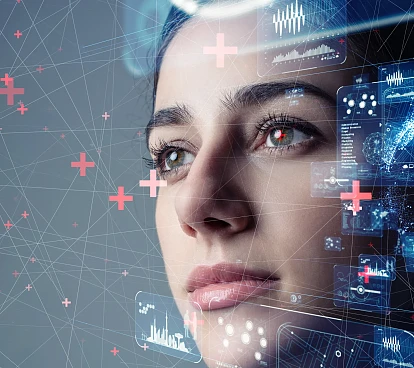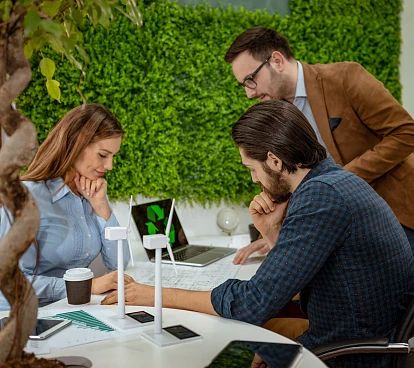
Driving Circular Economy: How SNGULAR Promotes Collaboration and Innovation
July 12, 2023
It's time to move forward with the alignment between sustainable development goals and technology-based solutions.
At SNGULAR, we embrace this challenge by bringing together a specialized and diverse team to research and design technological solutions that enhance or implement sustainability strategies in the companies we collaborate with.
We explore the concept and approach of the circular economy
The link between our way of living and its impact on the environment is undeniable. Aware of this, the circular economy seeks to minimize the impact of production and consumption on the use of finite resources. It also addresses biodiversity maintenance, air quality, and waste management. To achieve this, it proposes three principles:
- Eliminating waste and pollution.
- Ensuring that the consumption of products and services circulates in our lives at their highest value.
- Regenerating nature.
Therefore, we must transform our linear way of producing, consuming, and disposing of goods into a circular approach where we can return to nature what we use and reuse products in the best possible way.
The proposal, then, is to develop ourselves and continue building solutions while improving the quality of our environment with each action.
Our plan should be to embark together on a transition that enables us to transform towards a better and sustainable way of life.
How SNGULAR makes a significant impact on the sustainability challenge
Within the scope of our technology services proposal, we aim to implement an ESG (Environment, Social, Governance) analysis policy as a core part of our sustainability strategy. This enables us to understand how our work can contribute to the sustainability strategy of the community we are part of.
To achieve this, we have been exploring and researching different sources and have understood that there are still no global agreements or strategies. Regulations, priorities, and needs vary. However, we are convinced that we can tackle broad challenges by adapting to changing and uncertain scenarios, thanks to our agile methodology and a skilled team that guarantees successful project development.
We have set out the following actions:
- Designing solutions with an architecture capable of meeting needs while minimizing the use of natural resources.
- Promoting collaboration with teams specialized in sustainability.
- Enriching our diverse and profound knowledge in technology with topics related to traceability of production and consumption cycles, ESG, sustainable product design, and more.
- Our teams in data architecture, engineering, data analysis, and AI development are prepared to implement solutions that integrate operational data systems to share results and provide recommendations based on ESG indicators.
- Prioritizing collaborations with the education and research system on projects related to the preservation and recovery of natural environments, such as forest recovery prediction and biomass generation.
- Committing to minimizing waste and pollution in our offices and embracing remote work as a means to reduce the use of polluting transportation.
What opportunities have we discovered?
The circular economy presents itself as an alternative in two cycles: the biological and the technical. Products and materials involved in the technical cycle are kept in use through processes such as reuse, repair, refurbishment, and recycling. Biodegradable materials are returned to nature to regenerate it, completing the biological cycle.
This cyclical diagram presents a challenge for traceability, from capture and transformation to data storage and safeguarding. It also highlights the need to leverage all possibilities of AI.
- Our UX design teams bring experience in managing projects that implement sustainable initiatives.
- We have identified individuals within our teams who specialize in nature-based solutions, capturing data with IoT technology.
- It is a good time to work with our Data Scientists specializing in Computer Vision, who have evolved AI solutions for smart cities and waste management.
- For other AI applications in the circular economy concept, we add value with our experience in optimizing resource usage for logistics circuits, calculating the capacity to generate different types of energy, predicting the life cycles of circulating products, and the opportunity for soil reforestation.
- The pursuit of transparency and traceability using blockchain technology provides availability and minimizes risks at each cycle.
- Solution architecture with minimal carbon footprint impact is a cross-cutting commitment across our development teams.
- ESG data engineers and data analysts are new profiles specializing in the implementation of the strategy in each project.
- We prepare teams to design cybersecurity strategies with knowledge of new and different devices used to implement sustainable strategies.
It's time to embrace the past, present, and future in a collective embrace for our planet.
Our past experiences show us areas for improvement. The present offers opportunities and the necessity for a transition towards a sustainable way of life. The future can be enhanced with the technology and knowledge already within our reach.
Our latest news
Interested in learning more about how we are constantly adapting to the new digital frontier?

Tech Insight
January 13, 2025
How to bring your application closer to everyone

Insight
December 10, 2024
Groundbreaking technologies today that will reshape the innovation landscape in 2025

Insight
December 3, 2024
Sustainable Development: Minimizing Digital Footprint and Optimizing Consumption

Tech Insight
November 5, 2024
Impact Innovation: How to evaluate and design sustainable digital products
